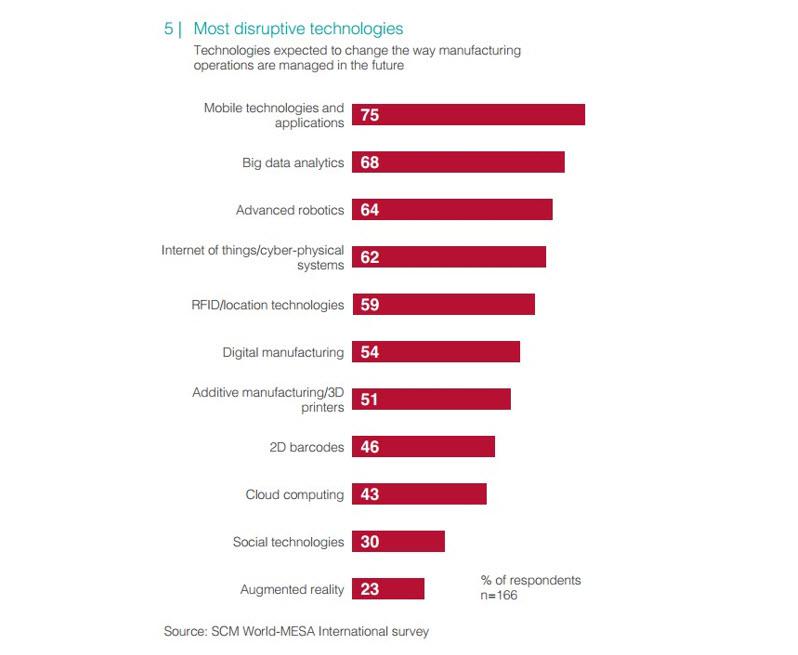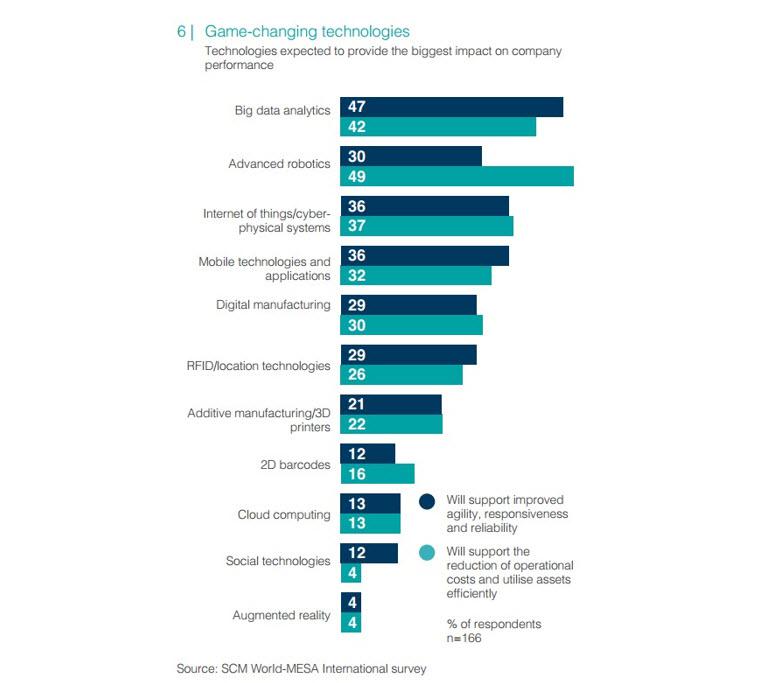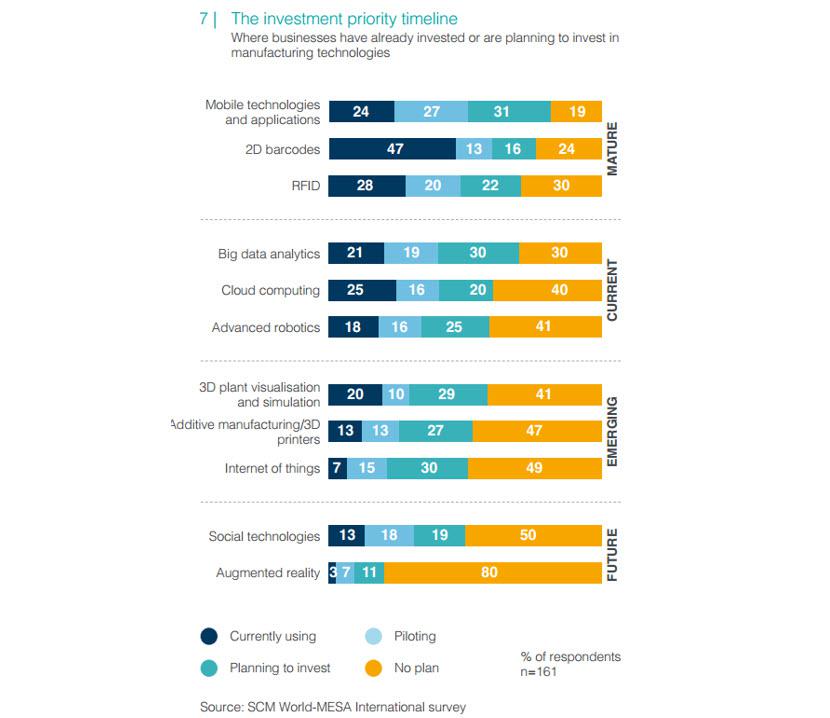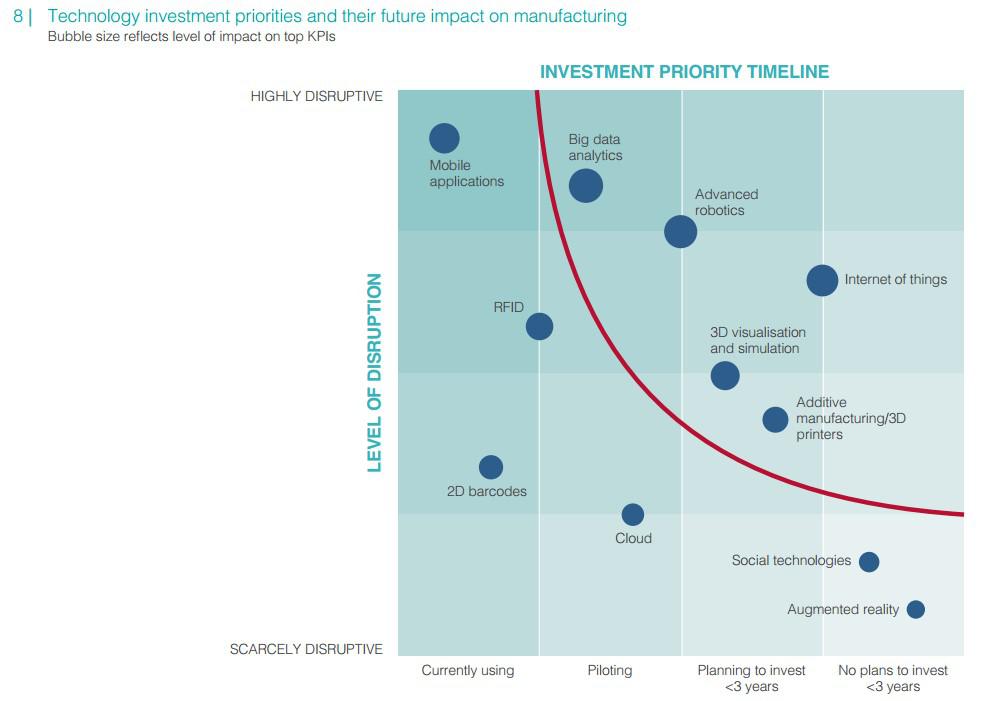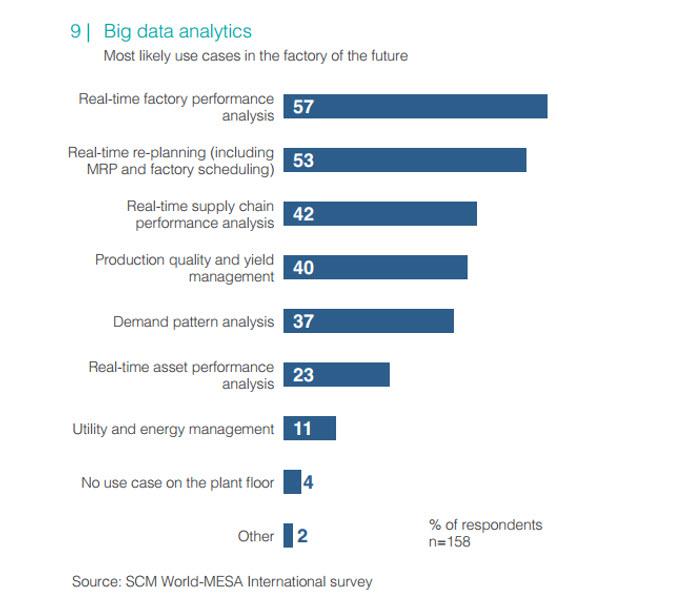 47% of manufacturers expect big data analytics to have a major impact on company performance making it core to the future of digital factories.
47% of manufacturers expect big data analytics to have a major impact on company performance making it core to the future of digital factories.
36% expect mobile technologies and applications to improve their company’s financial performance today and in the future.
49% expect advanced analytics to reduce operational costs and utilize assets efficiently.
These and additional take-aways are from the well-researched and written report from SCM World, The Digital Factory: Game-Changing Technologies That Will Transform Manufacturing Industry (Client access) by Pierfrancesco Manenti, November, 2014. SCM World and MESA International recently collaborated on a joint survey to define the landscape of manufacturing technology tools, defining an investment priority timeline.
Online surveys were sent to corporate members of SCM World and MESA International, with respondents from professional services and software sectors excluded from the analysis. Manufacturing & Production (22%), IT Technology (21%), Operations and Engineering (14% each) and General Management (8%) are the most common job functions of survey respondents. Respondents were distributed across Asia & Australia (22%), Europe, Middle East & Africa (40%) and North & South America (38%).
SCM World also recently launched their Design for Profitability survey to learn about how companies are improving their innovation success rate, and are offering a free copy of the final report in exchange for your participation.
Key take-aways from the study include the following:
- Mobile technologies and applications (75%), big data analytics (68%) and advanced robotics (64%) are considered the three most disruptive technologies by manufacturers today. SCM World notes that mobile technologies and applications are being progressively adopted across the plant floor, profoundly changing the way manufacturing operations are measured, controlled and supervised. The survey also found manufacturers globally have high expectations for big data analytics providing greater insights into how manufacturing operations can be improved. Cloud computing received a low ranking as a disruptive technology as manufacturers increasingly see it as an enabling technology.
- Big Data analytics (42%), advanced robotics (30%), mobile technologies and applications (36%), Internet of things/cyber-physical systems (36%) and digital manufacturing (29%) are the top five technologies manufacturers are relying on to improve agility, responsiveness and reliability of their operations. SCM World looked at which technologies will most impact the Supply Chain Operations Reference (SCOR) Models’ five Key Performance Indicators (KPIs) of reliability, responsiveness, agility, costs and asset utilization. SCM World grouped the five KPIs into speed (combining agility, responsiveness and reliability) and efficiency (combining costs and assets utilization). The results of this analysis are presented below.
- 58% of manufacturers are either piloting or planning to invest in mobile technologies and applications, followed by big data analytics (49%). The following investment priority timeline illustrates how manufacturers are prioritizing their technology investments by future, emerging, current and mature technologies.
- Comparing the investment priority timeline and level of technology disruption in the following technology investment priority grid further clarifies the impact of each technology on manufacturing. The relative size of the bubbles indicate the overall impact on SCOR Model KPIs. SCM World believes the five technologies to the right of the red curve will drive the greatest disruption in manufacturing in the next few years.
- Real-time factory performance analysis (57%), real-time planning (including MRP and factory scheduling) (53%), real-time supply chain performance analysis (42%) and production quality and yield management (40%) are the four most likely use cases for big data analytics in the digital factory of the future. Only 4% of manufacturers see no use case for big data analytics in the future.
- Intel’s big data analytics strategy is paying off. In 2012, Intel saved $3M in manufacturing costs by implementing preventative analysis on just a single line, and is now planning to extend the process to more chip lines and save an additional $30M in the next few years.
- GE Aviation has estimated that using big data analytics to enable “in process” inspection could increase production speeds by 25%, while cutting down on inspection after the building process is complete by another 25%
- Production tracking and remote factory monitoring (60%), track and trace across the supply chain (46%), and extended plant floor automation via machine-to-machine communication (40%) are the three most likely use cases of the Internet of Things in the digital factory of the future. SCM World found only 6% of manufacturers found no use case of the Internet of Things on the plant floor.
- Boeing is one of the early adopters of 3D printing technology, making more than 20,000 3D printed parts for 10 different military and commercial planes. SCM World found that the 787 Dreamliner has 30 3D printed parts, including air ducts and hinges, which is a record for the industry. GE Aviation has also acquired a few companies in this area and is planning to open the first high-volume additive manufacturing facility. SCM World found that fast prototyping, production of demo parts for marketing & trade shows (69%), production low-volume parts or components (51%) , and making tools and molds on the plant floor as required (42%) are the three most likely use cases of additive manufacturing and 3D printing in the digital factory of the future.
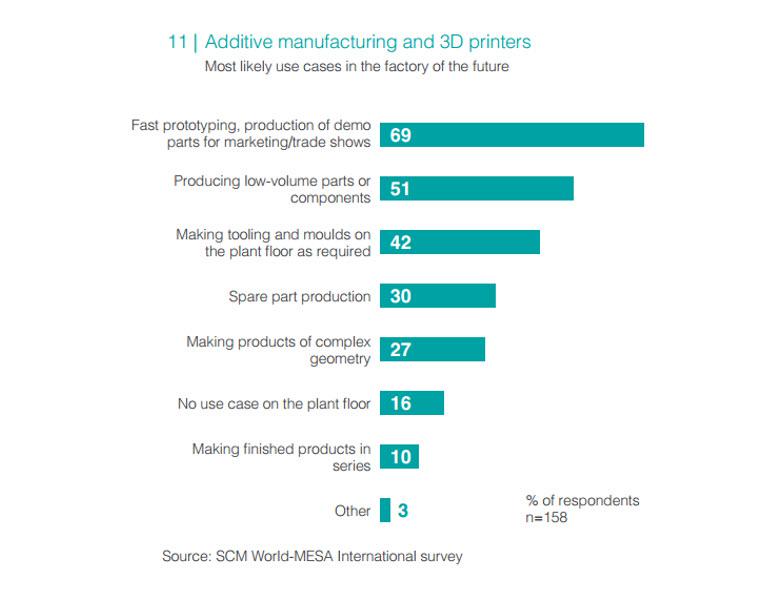
Source: SCM World, The Digital Factory: Game-Changing Technologies That Will Transform Manufacturing Industry by Pierfrancesco Manenti, November, 2014.

